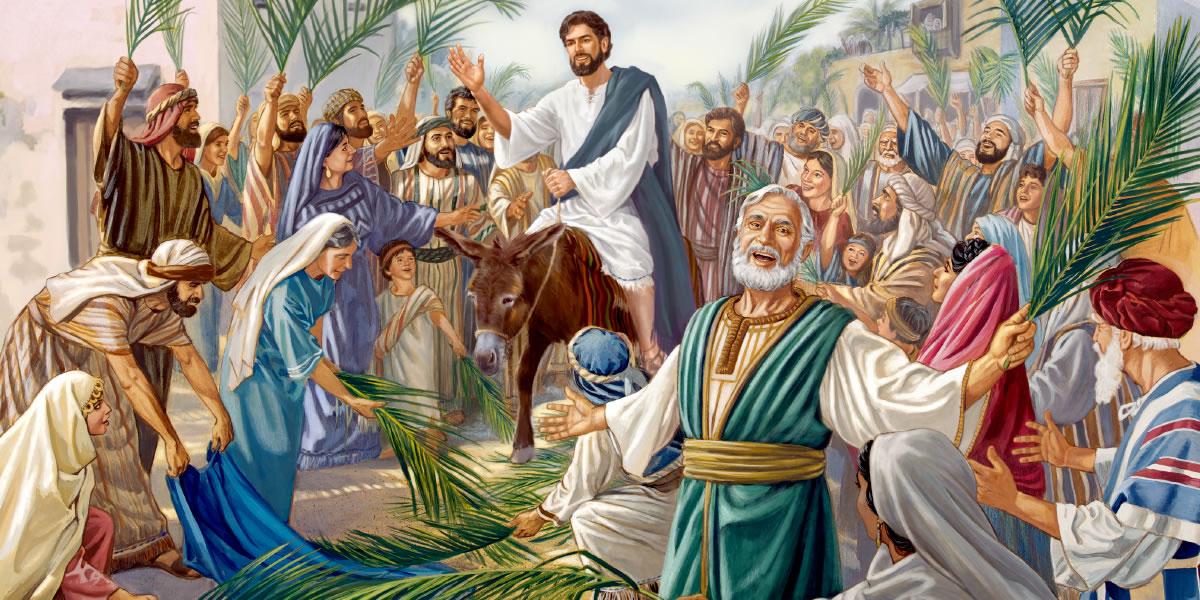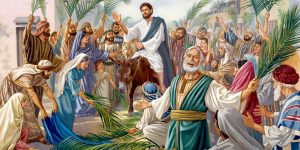
Mark 11:2 AV
And saith unto them,
Go your way into the village over against you:
and as soon as ye be entered into it,
ye shall find¹ a colt² tied³,
whereon never man sat;
loose him, and bring [him].
¹) To come upon, hit upon.
²) A young ass, or a young horse.
³) Bound, fastened.
Other translations
And instructed them, Go into the village in front of you, and as soon as you enter it, you will find a colt tied, which has never been ridden by anyone; unfasten it and bring it [here]. [AMP] and said to them, "Go into the village in front of you, and immediately as you enter it you will find a colt tied, on which no one has ever sat. Untie it and bring it. [ESV] "Go to the village across from you. As soon as you enter, you'll find a colt tethered, one that has never yet been ridden. Untie it and bring it. [MSB] And saith unto them, Go your way into the village over against you: and as soon as ye be entered into it, ye shall find a colt tied, whereon never man sat; loose him, and bring him. [KJV] saying to them, "Go to the village ahead of you, and just as you enter it, you will find a colt tied there, which no one has ever ridden. Untie it and bring it here. [NIV] "Go into that village over there," he told them, "and as soon as you enter it, you will see a colt tied there that has never been ridden. Untie it and bring it here. [NLT] and He said to them, "Go into the village opposite you; and as soon as you have entered it you will find a colt tied, on which no one has sat. Loose it and bring it. [NKJV]
Study
The village
The Ethiopic version renders it “the city”, and so reads a copy of Stephens’.
Maybe because of this some have thought that the city of Jerusalem is intended, but this is without any reason. Most likely the village was Bethphage.
Over against you
The location of the village was “over against” or “Opposite” either of Bethany, or of Nob. The used terminology also implies that it was somewhat off the main road.
The Syriac and Persic versions read, “over against us”: the sense is the same; for Christ and his disciples were together. This suits with either of the above mentioned places.
And as soon as ye be entered into it
As soon as you come to the town’s border, and to one of the first houses in it.
Ye shall find a colt tied
Matthew says, “an ass tied, and a colt with her” (Matthew 21:2); both are without a doubt true.
Colt
According to the usage of this word in the Greek papyri (ordinary written documents dating from NT times, that were made of papyrus reed), this was most likely a young donkey. A definition which is also in harmony with other Scripture usage.
Whereon never man sat
Which had never been backed and broke, and which makes it the more wonderful, that Christ should choose to ride upon it, and that it should quietly carry him:
The Jews regarded animals that had never been ridden as especially suited for holy purposes (cf. Numbers 19:2; Deuteronomy 21:3; 1 Samuel 6:7).
Loose him, and bring him
That is, bring him to me.
× 0 ×
The village opposite you is probably Bethphage.
Two disciples are instructed to pick up a colt there and bring it to Jesus.
It is possible that Jesus made an appointment with the owners in advance (cf. Luke 19:33), but it is also possible that Jesus had supernatural foreknowledge of the situation (cf. Mark 14:13). The remark that it is an unridden animal and the surprised reaction of the bystanders points in that direction.
The Greek word “põlos” (mount, horse) is used here in the manner of the LXX in the sense of ‘young donkey, ass colt’ (Genesis 32:16 LXX; Judges 10:4, 12:14; from these last two texts it appears that young donkey stallions were used as mounts).
The history of the entry is full of allusions to Messianic prophecies, although Mark, unlike Matthew (Matthew 21:4,5), makes no explicit mention of it.
▪︎ One can especially think of Zechariah 9:9, according to which text the coming Messiah, when He appeared, would enter Jerusalem riding on a donkey, on a donkey stallion, a young donkey.
▪︎ The idea of a tied donkey ”alludes to Genesis 49:11, another text with a Messianic meaning.
▪︎ The fact that the animal is still unridden indicates that it will be used for a special purpose (compare Numbers 19:2; Deuteronomy 21:3; 1 Samuel 6:7; 2 Samuel 6:3; compare Zechariah 9:9 LXX ‘a new donkey’).
Twitter: @SchoemakerHarry
Website 1: https://devotionals.harryschoemaker.nl
Website 2: http://bijbelplaatjes.nl



